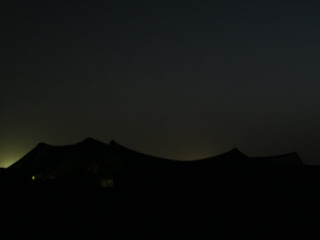Continuing from my previous post, here are my last few observations from the south, with slightly more chronological coherence...
My gateway to the south was Kandahar Air Field (KAF). For a major movement hub, it presents a startlingly high number of absurd obstacles to its transient population. Of particular interest to me was the Hellerian conundrum of badges. KAF has a specially issued badge, without which one cannot wander willy-nilly around the base. Instead, you must be escorted at all times. This includes getting to the badging cell across the street. Furthermore, the DSN (landline phone) is likewise beyond the un-badged quarantine. So, if one arrives at, say, 3am, and the individual you expect to pick you up isn’t answering their cell (as it’s 3am), you suffer the exquisite torture of being able to see your only means of calling support and the badging office, without being able to access either.
My night of sleeping in the terminal was somewhat redeemed by the good weather (I ended up nesting at the outbound terminal, which is outdoors) and excellent people watching it afforded. At one point, a pick-up rumbled by, towing about four six-foot long missiles on a trailer, crossing the path of a minivan with a ‘baby on board’ bumper sticker. Now, if only the sticker had been on the missiles…
I did finally manage to make it to Leatherneck, the American corner of the flagship base complex in Helmand. I apologize for not having any photos, but Leatherneck is a Marine base, and they’re extremely camera shy. Really. If they catch you with unregistered electronic equipment, it’s declared a security risk and whisked off to what down-range depot only heaven knows. I had to stash everything in the Site Manager’s office for the duration of my visit.
It was fun to notice how, even as this unwieldy complex was fairly homogenous (everything is a tent. And I do mean everything), each arm had some distinctive features. The British-run Bastion, for example, was the place to go for coffee, even if the carrot cake had overtones of cardboard. Meanwhile, the Afghan section had round-abouts, which are especially hilarious when navigated by top-heavy tactical vehicles. My favourite sub-base, though, might have been Camp Tombstone, home to a Danish OMLT. There, the MRAPs are parked in the OK Corral and the linguists stay at the Bella Union. I felt the joke was lost on them.
There are a few other points of interest for the next time you find yourself with some time to kill in Helmand, first among them the poppy located immediately outside the front gate. It is irrigated by base sewage water. I suppose it adds to the aroma. If, however, the finished product is more your thing, you might try hanging with the local national truck drivers, who apparently like to get all doped up in the holding pen outside the ECP just before they come on the FOB. Leatherneck also boasts a top-flight auto shop; I saw what was possibly the best after-manufacture mod ever – a dump truck with a turret. West Coast Customs has nothing on these guys.
In the interest of winning hearts and minds, the Marines have also set up a Pashtu-language radio station. While airing the latest music out of Iran and India (I didn’t ask about what kind of licensing rights they enjoyed), its programming includes PSAs about child trafficking, VOA reports, and readings from the Quran. The station also has two call-in lines – one to request music, and the other to report insurgent activity. Apparently, it had been used to stymie three planned attacks in the week before my arrival (insert moment of pride here for our linguists who comprise the station staff).
 |
| I was slightly stealthier at Dwyer and stole a few photos |
My ultimate site visit was to Camp Dwyer, a deceptively large Marine base to the southwest. The temperature frequently climbed to heights of 120 degrees, the heat wrapping around you and drowning you like water. Like Leatherneck, everything in is a tent, up to and including the mosque. I was hoping for a mini canvas minaret, but no soap.
Even so, Dwyer is not without its distractions. The British UAV pilots are extremely skillful with RC planes. They and the American UAV fliers have miniature dog fights, which the Union Jack invariably wins. This might have something to do with the fact the UK’s UAVs are little more than RC planes themselves. They sound like Estes rockets when they launch and have a biplane buzz when they fly overhead. My favourite memory of Dwyer, however, came at the gym. It was hot and humid, the air so thick with testosterone it was a bit difficult to engage in pranayama. Someone’s iPod provided the sound track, a driving mix of Disturbed, Lil Wayne, Linkin Park, and Taylor Swift. Wait, what? 200 Marines turned in unison to stare at the speakers, the same look of bemused incredulity on their faces. Then they turned back to their weights, muttering under their breath “it’s a love story - Baby just say yes…”
I eventually made my way back up to Kabul on an Australian flight out of Kandahar. Aussies seem to prefer the defensive technique of terrain flying, a somewhat more topsy-turvey method than other nationalities that go for altitude. The Special Forces sergeant to my right (the trip was oddly sandwiched by SF. I approved of the symmetry) regaled me with story of his first such flight. It had, by his account, been much worse, and two of his team members ended up vomiting into their Kevlars. I shudder to think about the next time they had a mission. I might have chalked it up to a combat loss and tried to avail myself of a new one.









